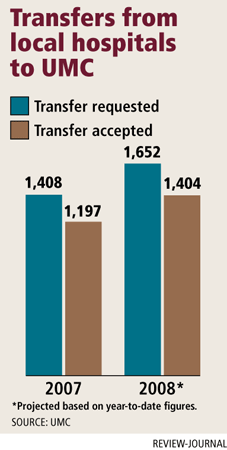Transfers put UMC in bind, officials report
University Medical Center has turned into a "dumping ground" for emergency-room transfers from area hospitals that choose not to offer certain types of urgent care, Clark County officials say.
Taking patients who were transferred from local and out-of-state hospitals cost UMC $1.6 million in the first quarter of the year, and at the current pace could cost $6.6 million by the end of the year, according to a UMC estimate.
By federal law, a hospital that provides the necessary care and has enough space in its emergency room must take patients from hospitals unable to provide the needed care.
Because UMC is a Level 1 trauma center, it has a wider array of services than other hospitals in the county, UMC chief executive Kathy Silver told commissioners at a meeting last week.
But many patients who end up at UMC by default could have been treated at the hospitals where they were first taken if those hospitals staffed their emergency rooms more thoroughly, Silver said.
"Some hospitals have chosen not to cover certain types of specialties in their emergency rooms," Silver said.
In most cases, the hospitals have doctors on staff who can treat the most common emergency ailments, but they don't use those doctors for urgent care, she said.
Orthopedic surgeons, urologists and eye, nose and throat specialists are prime examples.
On average, UMC takes 85 percent of the transfer requests. Last year, the hospital accepted 1,197 transfers, mostly from emergency rooms.
This year, the hospital is on pace to take 1,404 patients by the end of 2008.
Roughly half of those diverted to UMC are uninsured.
"It seems to be increasing our financial burden as we accept these transfers," said Dennis Dufak, director of the hospital's patient flow.
Dufak could recall only one case this year in which a UMC patient was sent to another facility. That patient needed to have an electrode in a pacemaker removed by laser surgery, he said.
"It appears to be unbalanced," Commissioner Chip Maxfield said, calling UMC a "dumping ground" for competing hospitals that don't want to provide similar emergency care.
Commissioner Chris Giunchigliani argued that some hospitals have found a loophole.
If those hospitals have specialists on staff but refuse to use them in emergency rooms, they're saving money by diverting the patients to the county hospital, Giunchigliani said.
"And the taxpayers are picking it up. They (hospitals) should be liable," she said
That tactic, she said, was similar to when private hospitals quit providing mental-health care and pushed those patients onto UMC.
Among the dozen area hospitals, Valley Hospital Medical Center and North Vista Hospital transferred the most patients to UMC in a 15-month period -- 151 and 260, respectively.
Gretchen Papez, Valley Medical Center spokeswoman, said the 151 transfers make up a minuscule portion of the 48,000 patients admitted to the hospital's emergency room during that time.
About 17 percent of the cases involved ear, nose and throat troubles, and 4 percent were urologic.
Valley Medical has specialists on staff who could handle all those problems, Papez said.
"We called them and, for whatever reason, they weren't available. So it was in the patients' best interest to transfer them," she said
Silver said UMC aims to introduce legislation that would require all hospitals in the state to provide core emergency services such as ear, nose and throat treatments.
Giunchigliani asked Silver whether it was possible for either the county or the state health board to enact rules that would require hospitals to offer basic emergency care if they have the doctors on staff.
Silver said she didn't know whether the state or local boards had the authority to create such regulations, but she will look into it.
Some hospitals have told UMC they would like to continue transferring patients there for services they don't ever plan to offer, Silver said. In return, those hospitals would pay UMC.
Silver said she would prefer the hospitals simply treat patients for the typical ailments that show up in emergency rooms.
"Hospitals that offer acute care should offer basic specialties for ER," Silver said.
Contact reporter Scott Wyland at swyland@reviewjournal.com or 702-455-4519.

















